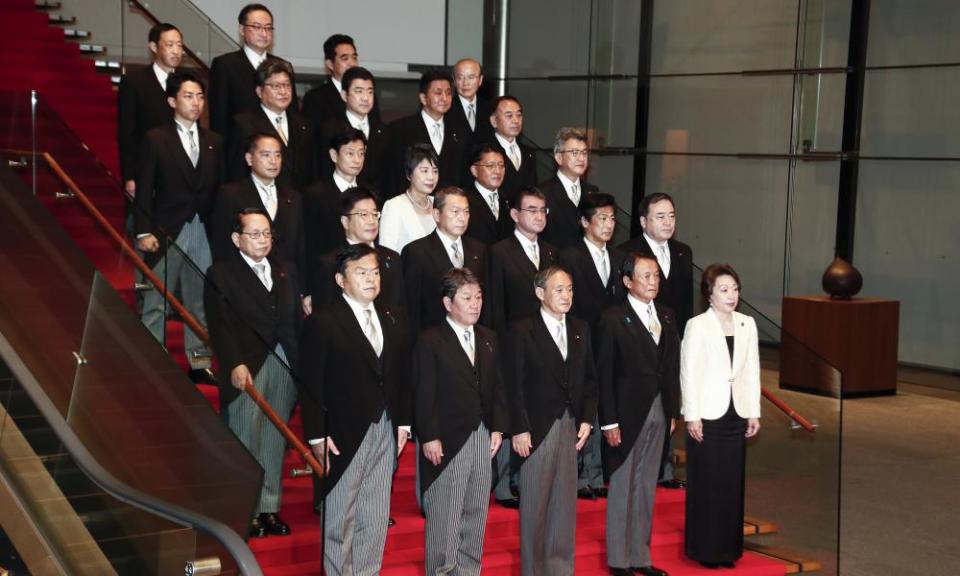Japan is a 'democracy without women', says ruling party MP

A prominent member of Japan’s ruling party has described the country’s politics as “democracy without women”, days after the new prime minister appointed just two female MPs to his cabinet.
Tomomi Inada, a former defence minister from the governing Liberal Democratic party (LDP), added her voice to criticism of Japan’s poor record on gender equality, directing most of her anger at her own party.
Related: Yoshihide Suga confirmed as Japan prime minister as Abe defends 'proud' legacy
“Women make up half of Japan’s population and 40% of the LDP grassroots membership,” she said on Wednesday. “If women do not have a place to discuss policies they want enacted, Japan’s democracy cannot help but be biased.”
During the campaign for leader of the LDP – who is practically assured of becoming prime minister due to its dominance in parliament – a group of female MPs submitted recommendations to the eventual winner, Yoshihide Suga, and his two male rivals on female representation in the cabinet and on the party’s executive.
“But looking at the result, with just two women in the cabinet, it looks like our proposals weren’t taken that seriously,” she said.
“I’m not saying this just for the sake of women. To enhance Japanese democracy and ensure it has a bright future I want to create a society in which women have more of a voice in politics. I want to realise a more free, democratic and diverse political landscape so that even in Japan women aim to become prime minister and girls aim to become politicians.”
Inada, a nationalist who has visited Yasukuni, a controversial war shrine, and cast doubt on claims that the Japanese military forced Korean women into sexual slavery during the war, said the LDP should look to France, Germany and other countries with a better record on female representation in politics.
So far, the only woman to have run for the LDP leadership in its 65-year history was Yuriko Koike, who left the party after being elected governor of Tokyo in 2016.
The conservative LDP is not alone, however. When Japan’s two main opposition parties merged earlier this month, the battle to become leader was fought between two men.
That male dominance is reflected in the lower house of Japan’s parliament, where just 9.9% of MPs are women, well below the international average of 25.1%, according to the Inter-Parliamentary Union.
In addition, Japan’s global ranking on gender parity placed it 121st out of 153 countries in the World Economic Forum 2020 report – 11 places down on the previous year and the largest gap among advanced economies.
Inada noted that Shinzo Abe, who resigned as prime minister on health grounds, was the first Japanese leader to prioritise women’s empowerment, “but it was presented as an economic policy. We should talk about its importance from the perspective of Japanese democracy”.
Under Abe, more women joined the workforce as part of his “Abenomics” push for economic growth, but many work in low-paid, part-time jobs. And in July, Japan quietly abandoned its goal of increasing the proportion of women in leadership roles to 30% by this year, pushing back its target date to 2030.
Women’s rights campaigners do not hold out much hope that Suga, who was Abe’s spokesman and confidante for almost eight years, will improve on his predecessor’s failed attempt to turn Japan into a country “in which women can shine”.
“I have no hope of seeing the new government break the glass ceiling for women,” Prof Hiroko Goto, who teaches gender and law at Chiba University, told Reuters after Suga was installed as prime minister last week.
“Suga will continue at the same pace going forward. He wants to keep the status quo, he has no intention to change – not only on women’s issues but also on other issues.”
Suga barely touched on gender issues during his leadership campaign, and then appointed just two women to his 21-member cabinet: the justice minister, Yoko Kamikawa, and the Olympics minister, Seiko Hashimoto.
Inada, an Abe protegé, and Seiko Noda, a former internal affairs minister, initially expressed an interest in running for the party leadership, with Inada telling a TV programme: “It benefits the LDP if women aspire to become leaders. If I get the chance, I would love to take up the challenge.”
But neither woman was able to overcome the first hurdle – securing the nomination of 20 LDP MPs, as the party’s major factions quickly coalesced around Suga.
Conservative members were reportedly put off by Inada’s support for single mothers and the campaign to allow married couples to have separate surnames – issues they believe will damage traditional family values.
To illustrate the sexism she believes is entrenched in the LDP, Inada recalled a speech she gave at a new year’s event in her constituency.
“Most of the people listening to me were men, but when I went to the kitchen, the female supporters were doing all the cooking. This is the political landscape of the LDP that I want to change,” she said. “I told the men, ‘Next year I want you all to put on an apron, and for lots of women to listen to me in the front row’.”

